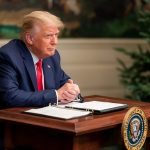In June 2016, the political landscape was rife with tension as Donald Trump geared up to take on Hillary Clinton in what would become one of the most memorable elections in recent history. A brilliant analysis at the time highlighted how a perfect storm of factors was driving voters—especially rural whites and disillusioned working-class folks—toward Trump, much to the surprise of the political elite. The narrative was clear: they were tired of being told what to think and how to feel by smug liberal elites and their incessant identity politics.
Amidst a national conversation dominated by issues like racial anxiety and political alienation, many Americans began to see Trump as a refreshing alternative. Unlike the establishment politicians who seemed determined to ignore the concerns of everyday citizens, Trump spoke in a language that resonated with those who felt left behind. His message cut through the clutter, appealing to those who were tired of feeling marginalized in their own country.
Kamala Harris: The discount Obama repeating Clinton’s failed 2016 playbook https://t.co/strJMvEYTE pic.twitter.com/y5Qz9ncLPk
— PACA (@PACA458) August 6, 2024
The media, of course, was in denial about this shift. They refused to recognize the genuine discontent brewing in rural America and instead opted to label it as mere bigotry or ignorance. But those who were paying attention could see that it was about more than just the surface issues; it was about the broader fear of losing a national identity to unchecked immigration and progressivism. These voters yearned for a return to traditional values, and they found that hope in Trump.
The identity politics pushed by Clinton and the Democrats only served to galvanize this movement. The more they insisted on dividing Americans by race, gender, and class, the more unified the opposing side became in resisting that narrative. Rural voters, often dismissed by urban elites as “bitter clingers,” were not about to be told how to live their lives or what should matter to them.
As the November election drew closer, it became increasingly clear that Trump’s appeal was not just a fleeting trend but the start of a political awakening among countless Americans. The establishment’s fears were realized: they had vastly underestimated the resolve of a population sick of being talked down to and ignored. Trump emerged as the champion of those tired of political correctness, and American voters responded decisively, turning the tide in a way that sent shockwaves through the political world.




